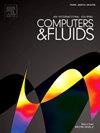A hybrid phase field-volume of fluid method for simulating dynamically evolving interfaces in multiphase flows
IF 2.5
3区 工程技术
Q3 COMPUTER SCIENCE, INTERDISCIPLINARY APPLICATIONS
引用次数: 0
Abstract
Moving boundary problems are ubiquitous in a plethora of applications encompassing nature and engineering, featuring interfaces that dynamically evolve with space and time. Despite the advancements in high performance computing over the recent years, the reported computational techniques for addressing such classes of problems continue to be challenged by a physically-consistent representation of the phase boundary topology. This deficit stems from the fact that whereas the established interface capturing techniques such as the volume of fluid (VOF) and the level set (LS) and a combination thereof (CLS-VOF) introduce mathematical variables for constructing the physical interface, the numerical parameters controlling the same may not necessarily connect with the fundamental thermodynamic considerations. On the other hand, the thermodynamically routed approaches such as phase field methods render to be computationally expensive while addressing an experimentally tractable physical problem where it may be difficult to map the experimental and simulation parameters. Bridging this gap, here we report a new hybrid interface capturing scheme that aims to amalgamate the computationally efficient interface construction approach for the VOF method and the thermodynamically-premised free energy-based diffuse interface description of the phase-field method. This enables the use of a standard second-order convection-diffusion scheme to apply a mass-conservative phase field formalism with standardized numerical parameters for interfacial advection and diffusion as opposed to the otherwise compulsive requirement of a fourth order differential equation for describing the phase field space for complying with the mass conservation constraint. We illustrate the efficacy of our method by benchmarking with reference to the established results on bubble dynamics, Rayleigh Taylor instability and film boiling. Our findings indicate the potential efficacy of this new approach as a balance between physical consistency and computational economy.
一种模拟多相流动态演化界面的相场-流体体积混合法
移动边界问题在包含自然和工程的大量应用程序中无处不在,其特点是接口随空间和时间动态发展。尽管近年来在高性能计算方面取得了进步,但解决这类问题的计算技术仍然受到相边界拓扑物理一致表示的挑战。这一缺陷源于这样一个事实,即尽管已建立的界面捕获技术,如流体体积(VOF)和水平集(LS)及其组合(CLS-VOF)引入了用于构建物理界面的数学变量,但控制它们的数值参数可能不一定与基本的热力学考虑相关联。另一方面,热力学路由方法,如相场方法,在解决实验上易于处理的物理问题时,计算成本很高,其中可能难以映射实验和模拟参数。为了弥补这一差距,本文提出了一种新的混合界面捕获方案,该方案旨在将计算效率高的VOF方法的界面构建方法与基于热力学前提的基于自由能的扩散界面描述相场方法相结合。这使得使用标准的二阶对流-扩散方案来应用具有标准化数值参数的质量守恒相场形式,用于界面平流和扩散,而不是强制要求使用四阶微分方程来描述相场空间,以符合质量守恒约束。我们通过参考气泡动力学、瑞利-泰勒不稳定性和膜沸腾的既定结果来说明我们的方法的有效性。我们的研究结果表明,这种新方法作为物理一致性和计算经济性之间的平衡的潜在功效。
本文章由计算机程序翻译,如有差异,请以英文原文为准。
求助全文
约1分钟内获得全文
求助全文
来源期刊

Computers & Fluids
物理-计算机:跨学科应用
CiteScore
5.30
自引率
7.10%
发文量
242
审稿时长
10.8 months
期刊介绍:
Computers & Fluids is multidisciplinary. The term ''fluid'' is interpreted in the broadest sense. Hydro- and aerodynamics, high-speed and physical gas dynamics, turbulence and flow stability, multiphase flow, rheology, tribology and fluid-structure interaction are all of interest, provided that computer technique plays a significant role in the associated studies or design methodology.
 求助内容:
求助内容: 应助结果提醒方式:
应助结果提醒方式:


